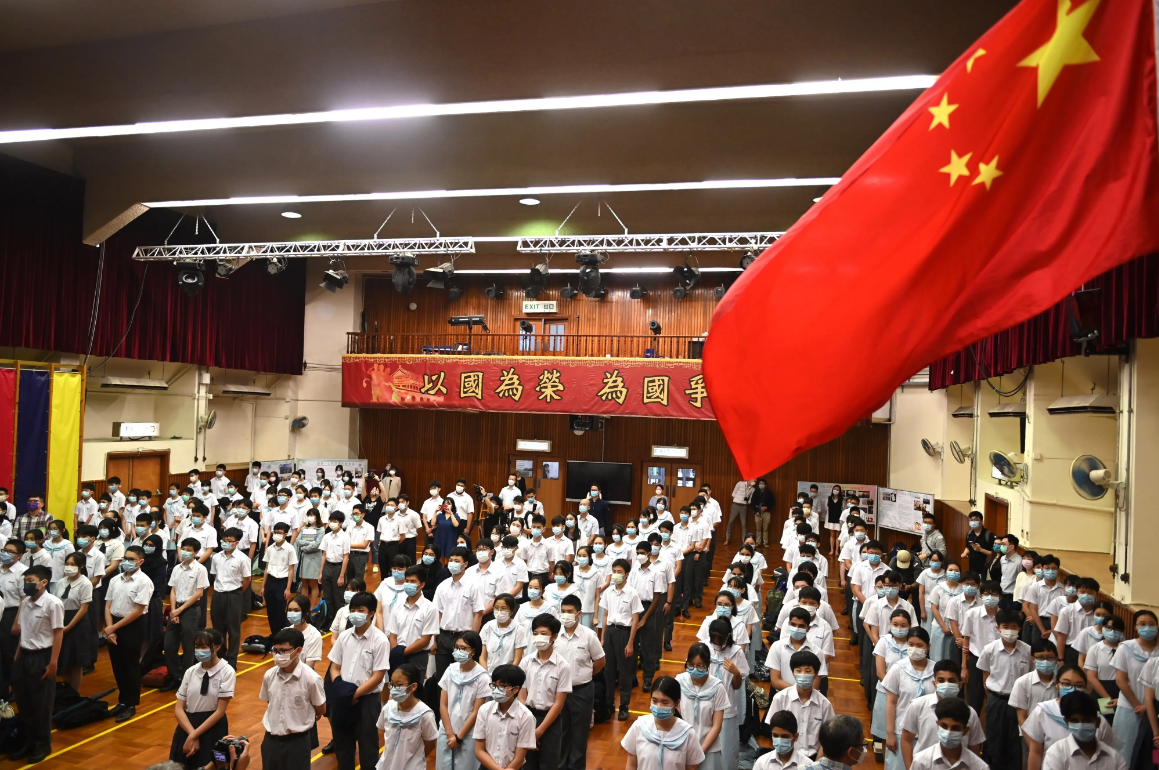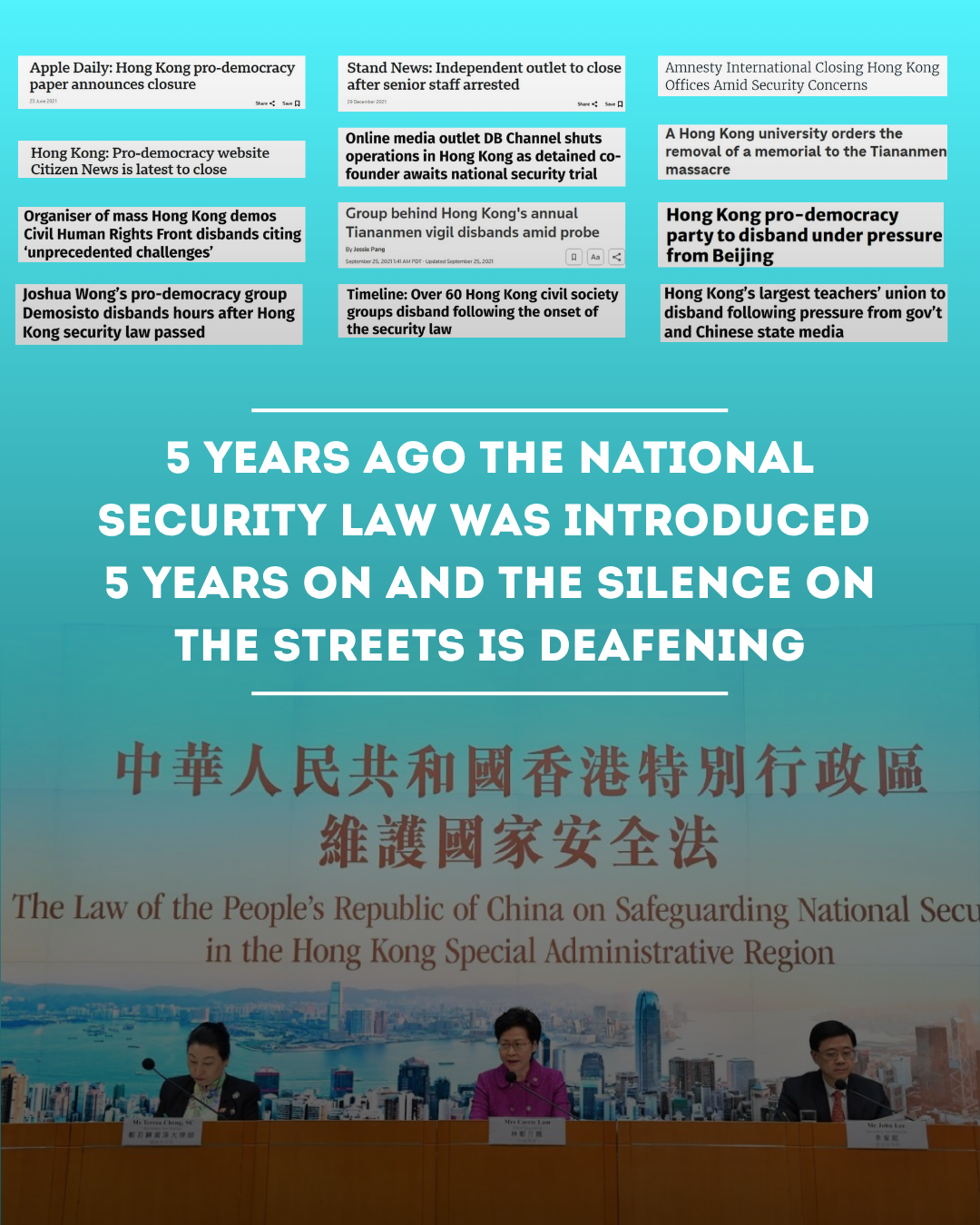This blog is authored by Committee for Freedom in Hong Kong Strategy and Public Affairs Adviser Shannon Van Sant.
Cognitive warfare is a means of controlling people’s mental states through the manipulation of environmental stimuli. The human mind becomes the battlefield, and the goal is often to inspire fear and intimidation, and divide societies. The Hong Kong government is increasingly waging this form of warfare on its own residents and Hong Kongers who have moved overseas.
Hong Kong’s imposition of HK$1 million bounties and arrest warrants on 19 pro-democracy advocates living abroad is one example. Through these bounties, the Hong Kong government aims to extend its authoritarian arm overseas and scare democracy advocates into silence. Committee for Freedom in Hong Kong Foundation staffers Chloe Cheung and Frances Hui, and Canadian political candidate Joe Tay, are among those on Hong Kong’s bounty list. Such tactics are not only meant to intimidate them, but the broader community of democracy and human rights activists, too. With its list of bountied individuals, the Chinese Communist Party (CCP) wishes to create a chilling effect that conveys to the world – if you speak up for human rights and democracy, this could happen to you.
“Exploring the winning strategy in cognitive domain operations,” an article in PLA Daily, the official newspaper of the Chinese People’s Liberation Army (PLA), says modern warfare has evolved from the “living room war” of the television era to the “palm-held war” of today, with cell phones. In another PLA Daily article, author Yang Chunshe writes that cognitive warfare directly targets people’s will, beliefs, and psychology to influence their decisions, and that the cognitive domain is now a constant battleground between great powers. The purpose of a cognitive attack is to manipulate an opponent’s will with “an invisible hand,” Yang writes, making the opponent feel, “I cannot” and “I dare not,” and then ultimately engender a feeling of apathy – “I don’t want to.”
Beijing’s online army targeting women journalists and Hong Kong pro-democracy activists exemplifies this form of cognitive warfare. Many have received threats of violence, abuse, and online misogynistic attacks remarking on their appearance and gender. The Australian Strategic Policy Institute (ASPI) found that online harassment of women journalists and analysts of Asian descent are most likely the result of a coordinated campaign to discredit the media. ASPI determined that graphic online depictions of sexual assault, homophobia, racist imagery, and threats to a person’s life “are a growing part of the CCP’s toolkit of transnational repression.” According to the Coalition for Women in Journalism the attacks have been, in part, successful, leading women to quit their jobs or even their professions altogether.
The CCP has also used surveillance and data collection as a means of targeting Hong Kongers. The PLA Daily writes of using online data to build a “cognitive portrait” of a targeted person, and then with the help of algorithms and technology, pushing information to the target to influence their attitude, emotions, and values.
This spring, actions directed towards Hong Kong democracy advocates grew beyond the online space to include “wanted” posters sent by mail to their neighbors’ homes in London. The posters urged residents to provide information on the democracy advocates to the Hong Kong Police Force, or take them “to the Chinese embassy,” offering a reward of HK$1 million.
At about the same time, in Australia, Hong Kong dissident Ted Hui received a threatening letter. The anonymous letter was mailed from Hong Kong and sent to colleagues in his Adelaide law firm. It said that Hui, a former pro-democracy legislator in Hong Kong, was wanted for a range of “national security related offenses.” The letter offered Hui’s officemates AU$203,000 for information on his whereabouts and that of his family.
Last month, fake pamphlets pretending to be from Hui’s law firm were also sent to Adelaide mosques, falsely claiming he was a pro-Israel lawyer wishing to wage war against Islamic terrorism. Separately, anonymous letters were sent to residents in Melbourne, Australia, offering a bounty if they provided information on an Australian citizen and another pro-democracy activist, Kevin Yam. The letters and pamphlets were attempts at intimidation and to undermine social cohesion, The Guardian reported.
Letters purporting to be from Ted Hui’s law firm sent to Adelaide mosques
typify evolutions in CCP cognitive warfare. (The Guardian)
With advancements in artificial intelligence (AI), Beijing is poised to strengthen these tactics targeting dissidents and activists domestically in China, and overseas. The CCP is already experimenting with AI to shape the information space. In a paper for the Jamestown Foundation, I wrote of a series of “news” websites amplifying Beijing’s preferred narratives on a range of topics, including Hong Kong. The “reporters” for the websites had AI-generated photos, fake names and biographies. The CCP has also disseminated fake audio, AI-generated news anchors, broadcasts, and memes to influence elections in Taiwan. As Taiwan-based civil society organisation Doublethink Lab has reported, these efforts increasingly seek to stoke existing societal divisions, polarise societal views, and undermine faith in democracy.
To counter these tactics, we need to offer as much support as possible to democracy advocates who have fled China, seeking peace and comfort overseas. Secondly, democratic countries need to step up efforts to improve media literacy and counter foreign interference through collaboration between government agencies, educational institutions, and technology companies. Finally, the U.S., Canada, and the UK should all sanction the Hong Kong officials responsible for waging cognitive warfare on their own people while intensifying repression in Hong Kong and overseas.







